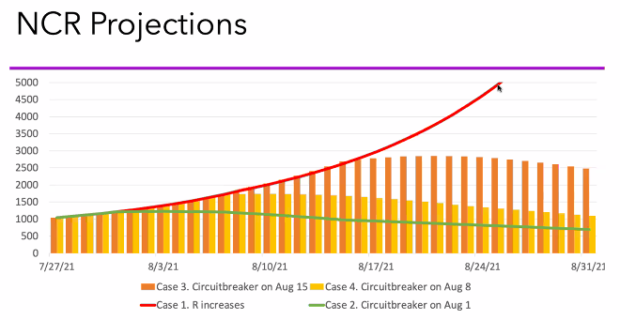
Projection of COVID-19 case trend in Metro Manila if a “circuit-breaking” lockdown will not be imposed (Graph from OCTA Research)
MANILA, Philippines — Metro Manila could see over 5,000 average daily new COVID-19 cases and overwhelmed hospitals by the latter part of August if a “circuit-breaker” lockdown will not be imposed, according to OCTA Research’s projections disclosed Wednesday.
OCTA Research fellow and molecular biologist Fr. Nicanor Austriaco Jr. said that “once a Delta surge begins, it accelerates in an explosive fashion.”
“Projections based on the behavior of the Delta variant in our Asean neighbors suggest that the surge will begin to impact our healthcare system in the NCR by the middle of August. Our hospitals will become overwhelmed by the end of August,” he said in an online media forum.
Austriaco bared this projection as he presented the bases of the OCTA Research for recommending an early lockdown for Metro Manila as a preventive measure for the imminent spread of the COVID-19 Delta variant.
According to Austriaco, no country in the Asean region was able to halt and reverse the surge of cases caused by the Delta variant without a hard lockdown of major cities.
“The longer we wait to act, the harder it will be to halt and reverse the surge,” he stressed.
“In my view, it is not a question of whether or not we will have a hard lockdown. Instead, it is when and for how long,” he added, noting that “an earlier lockdown is a shorter lockdown.”
Austriaco said that in Metro Manila, the hospitalization rate for COVID-19 patients is about 16 percent. He adds that there is an estimated 9,333 total bed capacity in the region.
Meanwhile, projections presented by Guido David, also an OCTA Research fellow, showed that the new daily cases in Metro Manila could exceed 5,000 by the latter part of August if a lockdown will not be imposed.
He said that an early “circuit-breaker” lockdown starting August 1 may need just two weeks or even a week for the government to regain effective control of the pandemic. Meanwhile, two to three weeks will be needed to regain control of the cases if a lockdown begins on August 8.
But he also stressed that a late lockdown on August 16 may result in high caseloads above 2,500 per day for the remainder of the month and will eventually require a longer lockdown period because cases are already higher at that time.
Another OCTA Research fellow Professor Ranjit Rye said that “if we continue with the status quo, OCTA projects that we will have an alarming 2,000 new cases daily on average in the NCR by August 10.”
“By August 17, we will have 3,000 cases, which will now threaten our healthcare capacity,” he added.
OCTA member Michael Tee then mentioned that the most important preparation for a possible surge in COVID-19 Delta variant cases is to ensure that there are enough healthcare workers (HCW).
“This will allow us to convert hospital beds with agility when the surge happens. In the meantime, the additional HCW will be helpful in improving care during non-surge periods,” he explained.
RELATED STORIES

